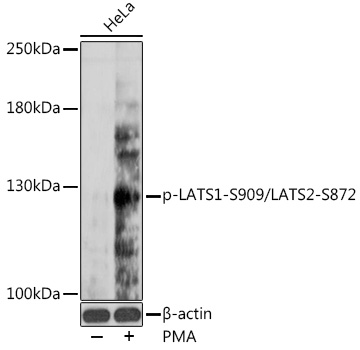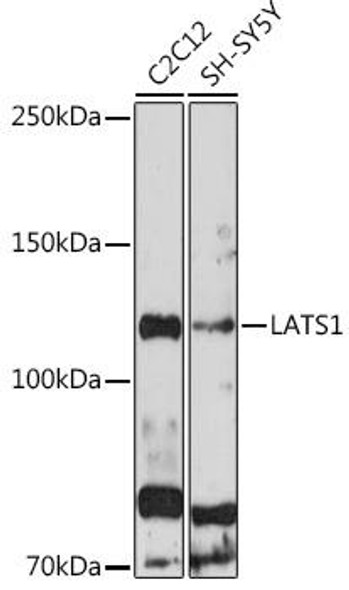Cell Biology Antibodies 17
Anti-phospho-LATS1-S909/LATS2-S872 Antibody (CABP0904)
- SKU:
- CABP0904
- Product Type:
- Antibody
- Reactivity:
- Human
- Host Species:
- Rabbit
- Isotype:
- IgG
- Antibody Type:
- Polyclonal Antibody
- Research Area:
- Cell Biology
Description
| Antibody Name: | Anti-phospho-LATS1-S909/LATS2-S872 Antibody |
| Antibody SKU: | CABP0904 |
| Antibody Size: | 20uL, 50uL, 100uL |
| Application: | WB |
| Reactivity: | Human |
| Host Species: | Rabbit |
| Immunogen: | A phospho specific peptide corresponding to residues surrounding S909 of human LATS1. |
| Application: | WB |
| Recommended Dilution: | WB 1:500 - 1:2000 |
| Reactivity: | Human |
| Positive Samples: | HeLa |
| Immunogen: | A phospho specific peptide corresponding to residues surrounding S909 of human LATS1. |
| Purification Method: | Affinity purification |
| Storage Buffer: | Store at -20°C. Avoid freeze / thaw cycles. Buffer: PBS with 0.02% sodium azide, 50% glycerol, pH7.3. |
| Isotype: | IgG |
| Sequence: | Email for sequence |
| Gene ID: | 9113/26524 |
| Uniprot: | O95835/Q9NRM7 |
| Cellular Location: | Cytoplasm, centrosome, cytoskeleton, microtubule organizing center |
| Calculated MW: | 76kDa/126kDa |
| Observed MW: | 126kDa |
| Synonyms: | LATS1, WARTS, wts |
| Background: | The protein encoded by this gene is a putative serine/threonine kinase that localizes to the mitotic apparatus and complexes with cell cycle controller CDC2 kinase in early mitosis. The protein is phosphorylated in a cell-cycle dependent manner, with late prophase phosphorylation remaining through metaphase. The N-terminal region of the protein binds CDC2 to form a complex showing reduced H1 histone kinase activity, indicating a role as a negative regulator of CDC2/cyclin A. In addition, the C-terminal kinase domain binds to its own N-terminal region, suggesting potential negative regulation through interference with complex formation via intramolecular binding. Biochemical and genetic data suggest a role as a tumor suppressor. This is supported by studies in knockout mice showing development of soft-tissue sarcomas, ovarian stromal cell tumors and a high sensitivity to carcinogenic treatments. |







